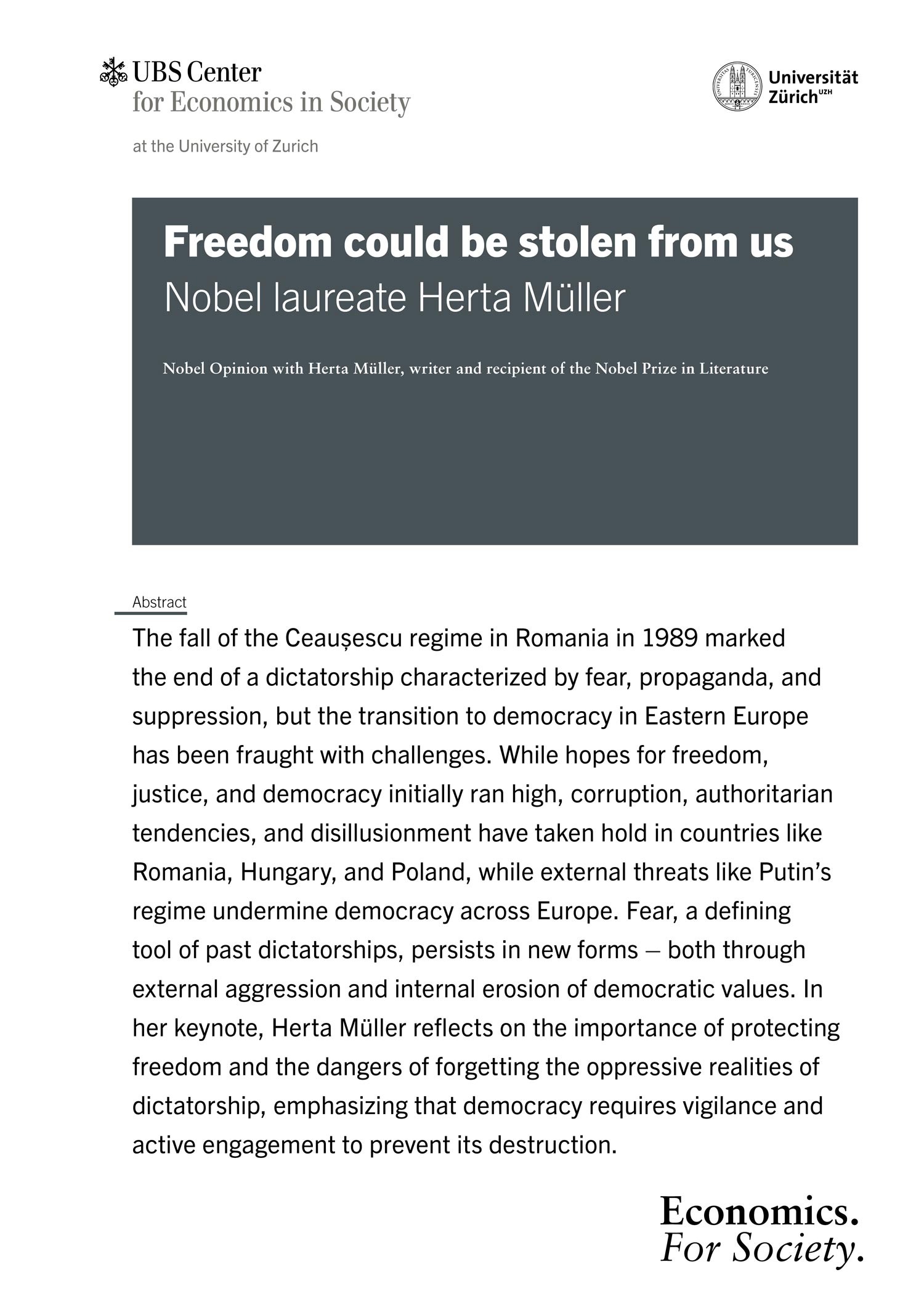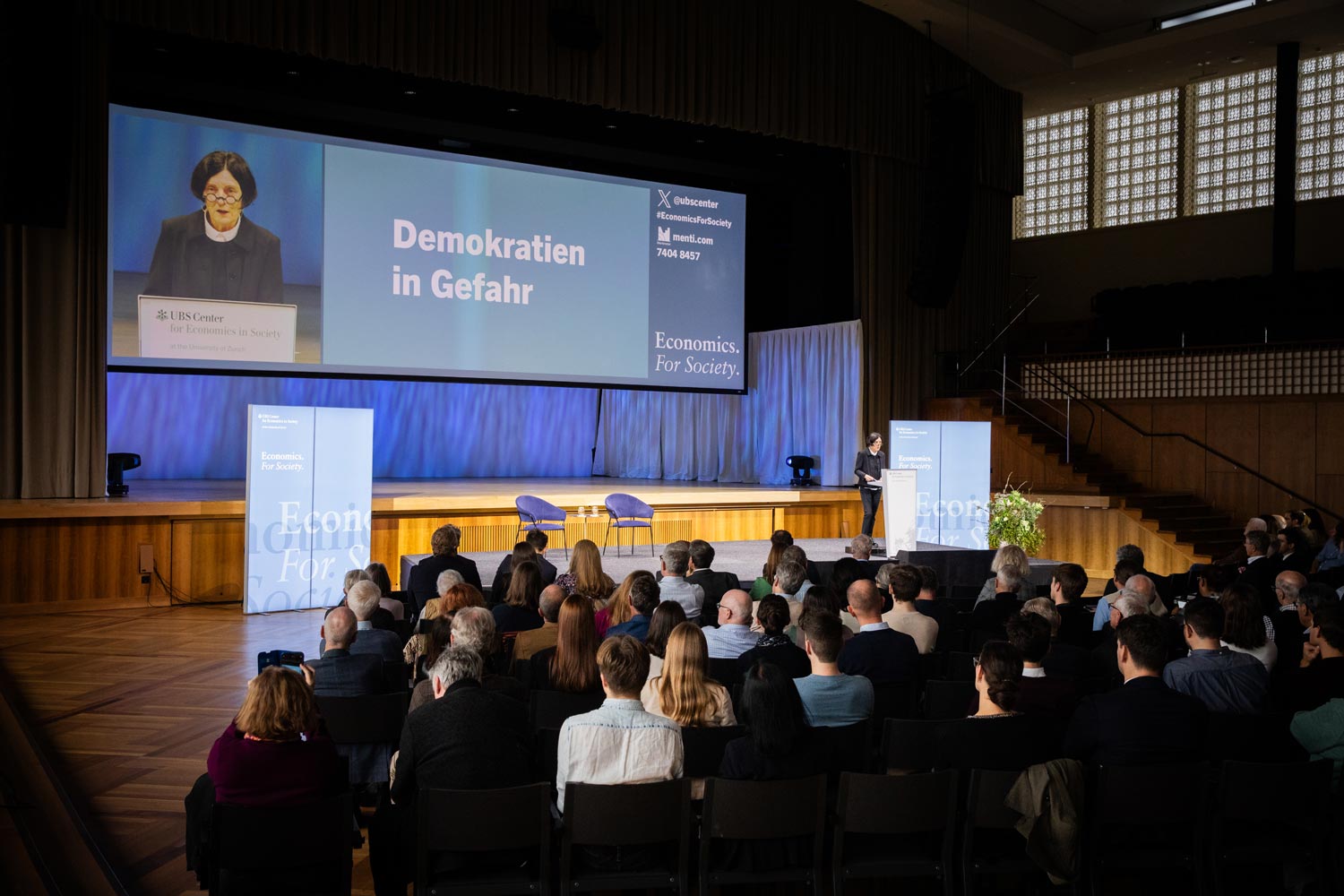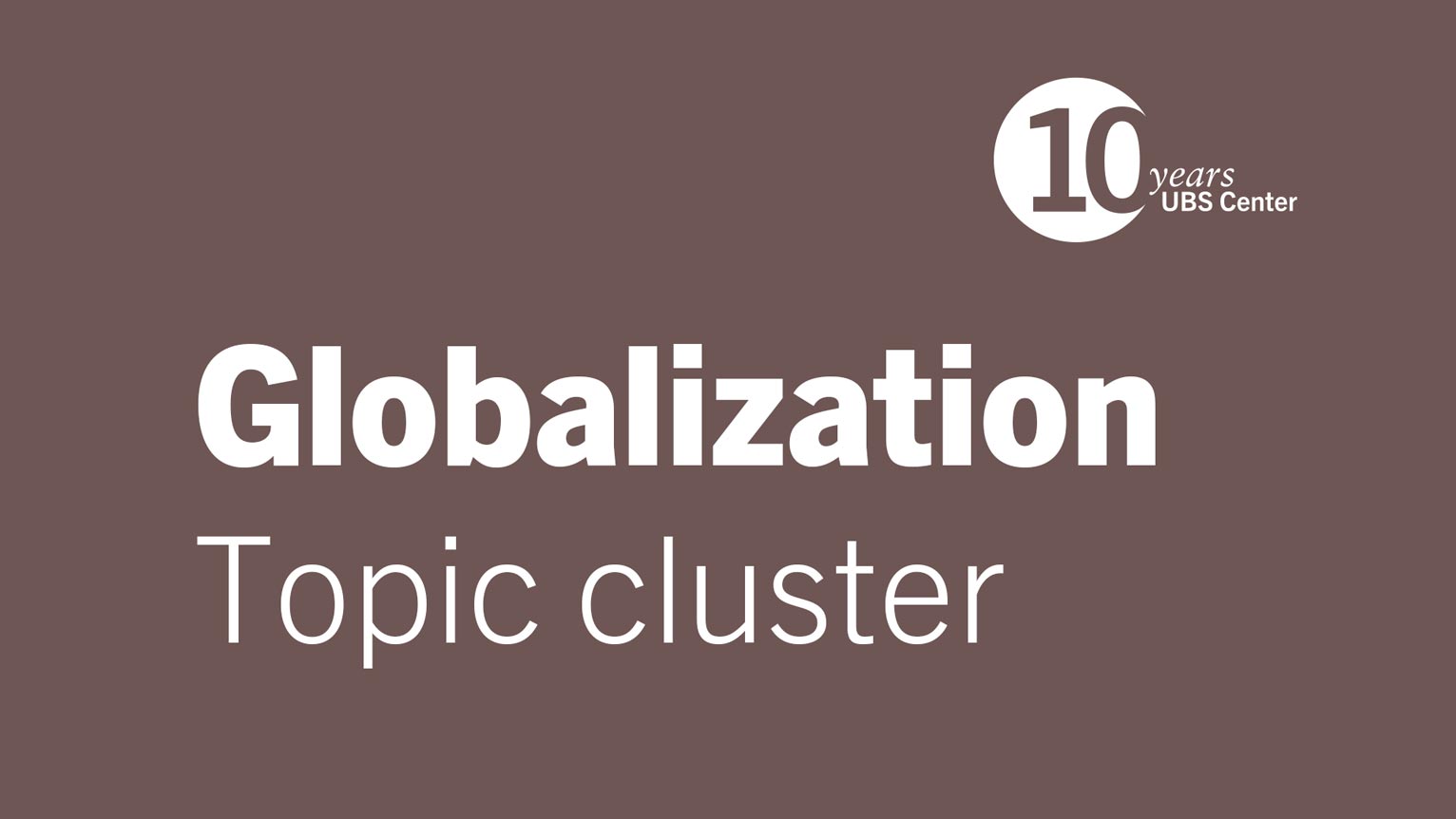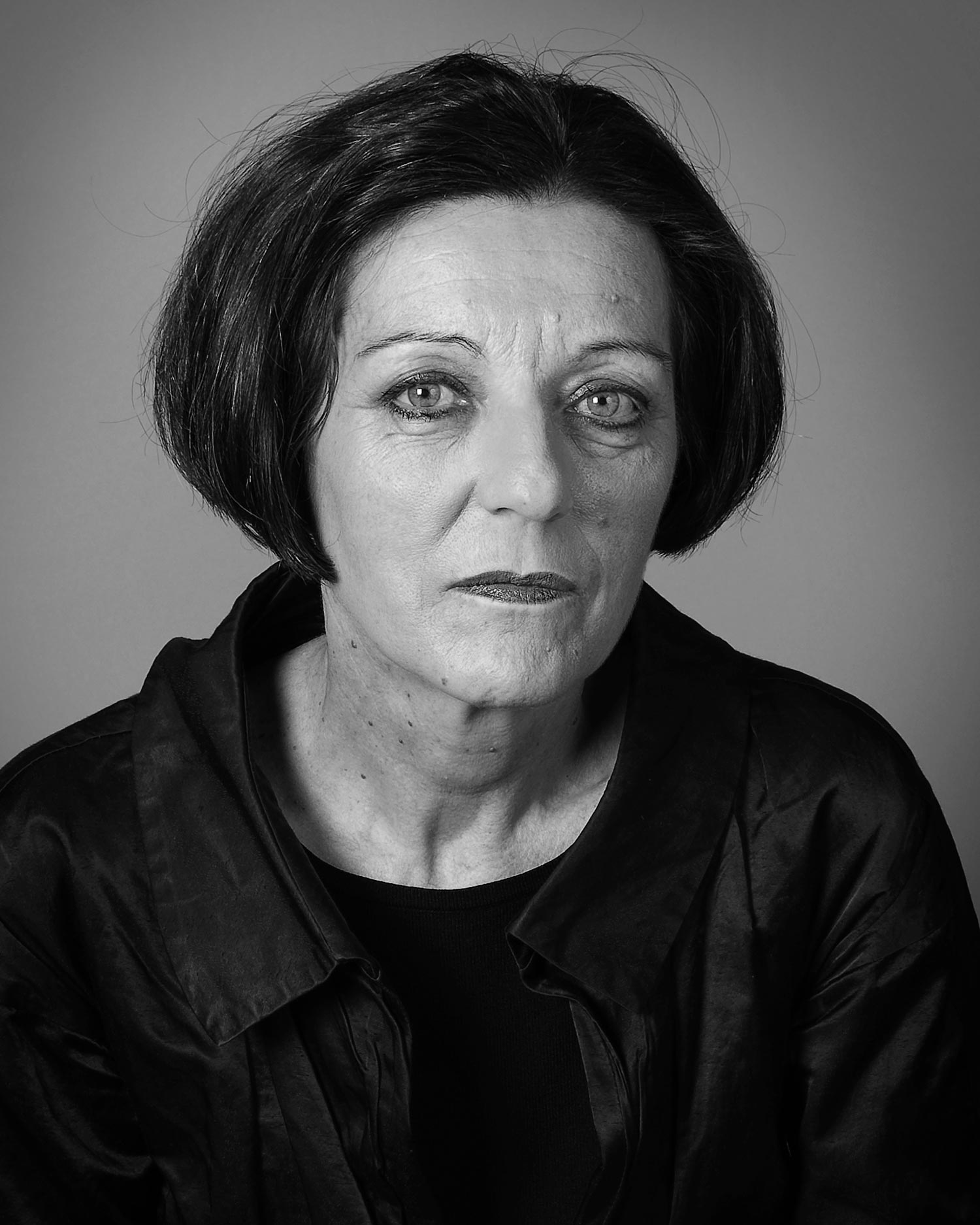Freedom could be stolen from us
The fall of the Ceaușescu regime in Romania in 1989 marked the end of a dictatorship characterized by fear, propaganda, and suppression, but the transition to democracy in Eastern Europe has been fraught with challenges. While hopes for freedom, justice, and democracy initially ran high, corruption, authoritarian tendencies, and disillusionment have taken hold in countries like Romania, Hungary, and Poland, while external threats like Putin’s regime undermine democracy across Europe. Fear, a defining tool of past dictatorships, persists in new forms – both through external aggression and internal erosion of democratic values. Herta Müller reflects on the importance of protecting freedom and the dangers of forgetting the oppressive realities of dictatorship, emphasizing that democracy requires vigilance and active engagement to prevent its destruction.
This summary is part of a compilation of speeches delivered by Nobel laureates at UBS Center events. We invite you to explore our Nobel Opinions and find out more about their research, their vision, and their solutions to address some of the most pressing issues of our time.
The fall of the Ceaușescu regime in Romania in 1989 marked the end of a dictatorship characterized by fear, propaganda, and suppression, but the transition to democracy in Eastern Europe has been fraught with challenges. While hopes for freedom, justice, and democracy initially ran high, corruption, authoritarian tendencies, and disillusionment have taken hold in countries like Romania, Hungary, and Poland, while external threats like Putin’s regime undermine democracy across Europe. Fear, a defining tool of past dictatorships, persists in new forms – both through external aggression and internal erosion of democratic values. Herta Müller reflects on the importance of protecting freedom and the dangers of forgetting the oppressive realities of dictatorship, emphasizing that democracy requires vigilance and active engagement to prevent its destruction.
This summary is part of a compilation of speeches delivered by Nobel laureates at UBS Center events. We invite you to explore our Nobel Opinions and find out more about their research, their vision, and their solutions to address some of the most pressing issues of our time.

Democracies under threat
Democracies around the globe are increasingly under threat. In many countries, populists are gaining ground, polarization is increasing, and voters often fail to vote. Public intellectuals are debating the prospects for post-democratic politics. At the same time, authoritarian regimes are seeing a resurgence. What is driving these trends? And what can be done to reverse them? In 2023 this was the main topic of the annual Forum for Economic Dialogue, where experts from various fields discussed the topic from both a political and an economic perspective. Nobel laureate Herta Müller captivated the audience with her powerful and moving speech.
Democracies around the globe are increasingly under threat. In many countries, populists are gaining ground, polarization is increasing, and voters often fail to vote. Public intellectuals are debating the prospects for post-democratic politics. At the same time, authoritarian regimes are seeing a resurgence. What is driving these trends? And what can be done to reverse them? In 2023 this was the main topic of the annual Forum for Economic Dialogue, where experts from various fields discussed the topic from both a political and an economic perspective. Nobel laureate Herta Müller captivated the audience with her powerful and moving speech.

Video
How to rewire globalization
The increasing interdependence of world economies is a key aspect of globalization which comes with a multitude of consequences for the world population. Yet there are numerous worrisome effects, commonly referred to as the globalization backlash. Resurgent nationalism and increasing populism, rejection of free trade, opposition to immigration, growing global inequality, and a retreat from multilateralism: These are the defining issues of our time that fuel the globalization backlash. What are the causes of these phenomena and what are effective solutions to address these issues? Answers to these and other important questions are provided by numerous experts in lectures, interviews, and papers made possible by the UBS Center.
The increasing interdependence of world economies is a key aspect of globalization which comes with a multitude of consequences for the world population. Yet there are numerous worrisome effects, commonly referred to as the globalization backlash. Resurgent nationalism and increasing populism, rejection of free trade, opposition to immigration, growing global inequality, and a retreat from multilateralism: These are the defining issues of our time that fuel the globalization backlash. What are the causes of these phenomena and what are effective solutions to address these issues? Answers to these and other important questions are provided by numerous experts in lectures, interviews, and papers made possible by the UBS Center.

Nobel Prize in Literature 2009
The Nobel Prize in Literature 2009 was awarded to Herta Müller “who, with the concentration of poetry and the frankness of prose, depicts the landscape of the dispossessed”.
Learn more how dictatorship breeds a fear and alienation that stays in an individual's mind.
The Nobel Prize in Literature 2009 was awarded to Herta Müller “who, with the concentration of poetry and the frankness of prose, depicts the landscape of the dispossessed”.
Learn more how dictatorship breeds a fear and alienation that stays in an individual's mind.

Speaker
Herta Müller was born in Romania in 1953, studied Romanian and German literature in Timisoara, and later worked as a translator in a machine factory. Because she refused to spy on her colleagues for the Romanian secret service (Securitate), she lost her job and became a target of the Securitate herself. In 1987, Herta Müller came to Germany, where she was unable to shake off Romania’s communist regime and the persecuting terror of the Securitate for a long time. They were still on her heels in West Germany. The persistent presence of persecution by the regime is reflected in her numerous award-winning publications. In 2009, she received the Nobel Prize in Literature. Her work has been translated into over 50 languages.
Herta Müller was born in Romania in 1953, studied Romanian and German literature in Timisoara, and later worked as a translator in a machine factory. Because she refused to spy on her colleagues for the Romanian secret service (Securitate), she lost her job and became a target of the Securitate herself. In 1987, Herta Müller came to Germany, where she was unable to shake off Romania’s communist regime and the persecuting terror of the Securitate for a long time. They were still on her heels in West Germany. The persistent presence of persecution by the regime is reflected in her numerous award-winning publications. In 2009, she received the Nobel Prize in Literature. Her work has been translated into over 50 languages.